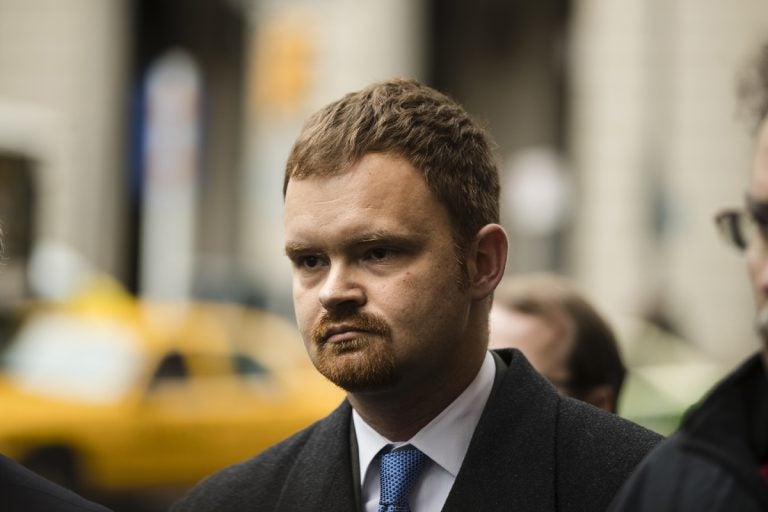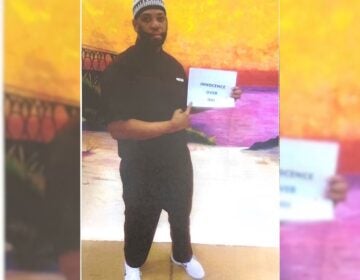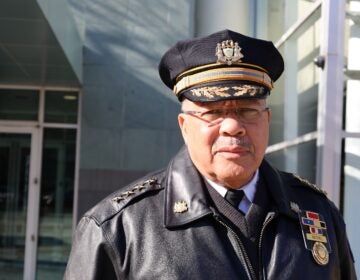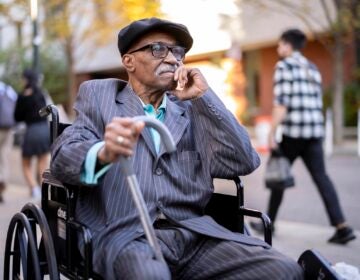Jury selected for trial of Amtrak engineer in deadly 2015 derailment
A jury has been chosen in the criminal trial of train engineer Brandon Bostian, 38, for his role in a deadly 2015 Amtrak derailment in North Philadelphia.

File photo: Brandon Bostian, the engineer involved in the 2015 Amtrak derailment in Philadelphia, departs from the center for criminal justice in Philadelphia after a hearing, Wednesday, Dec. 20, 2017. (Matt Rourke/AP Photo)
A jury has been chosen in the criminal trial of train engineer Brandon Bostian, 38, for his role in a deadly 2015 Amtrak derailment in North Philadelphia.
Eight people died and nearly 200 were hospitalized after Train 188 hit a curve in the track near Frankford Junction and jumped the rails. The speed limit at that spot was 50 mph, but the last recorded train speed was 102 mph, according to the accident report from the National Transportation Safety Board.
Bostian faces one count of causing a catastrophe, eight counts of involuntary manslaughter, and more than 200 counts of recklessly endangering another person. The jury must decide whether he made a simple mistake, or if his actions constitute a crime because he knowingly or recklessly put people in danger, per Pennsylvania statute.
Eight women and four men will serve on the jury, along with three alternates.
On Thursday morning, Bostian rejected a plea deal.
“You are exposing yourself to more than a lifetime of incarceration,” said Judge Barbara McDermott, clarifying that he understood the consequences.
Bostian said he did.
‘Day of reckoning’
It was a long, winding road to trial.
After the incident, Amtrak admitted fault and paid victims and their families $265 million dollars in a settlement.
Then-district attorney Seth Williams declined to prosecute Bostian. Attorneys representing the estates of some who died and other victims then filed a private criminal complaint in 2017. The Pennsylvania Attorneys General’s office took up the case. It then bounced around the court system until 2020, when the Pennsylvania Superior Court ruled that prosecutors had enough evidence to bring the case to trial.
“This is a day of reckoning,” said Tom Kline, one of the attorneys who represents victims and the estates of those who died in the derailment. He said many of the victims and family members of those who died want a public accounting of what happened, since an earlier civil case never went to trial.
Bostian’s attorney Brian McMonagle told WHYY earlier in the week, “This has just been a case the likes of which I’ve never seen in 30 years.”
The NTSB report following the incident, which did not seek to determine blame, noted that Bostian had been tuning into radio reports from a SEPTA engineer who described his windshield shattering after rocks were thrown at his train. Investigators determined he may have lost “situation awareness,” or lost track of where he was in the route, causing him to accelerate too early. Bostian suffered a concussion and medical records of his treatment showed he had some memory loss around the event.
Since the derailment, automatic braking technology called positive train control has been installed, a safety measure that had been called for for decades and which the NTSB found could have prevented the catastrophe.
In allowing the case to go to trial, Pennsylvania superior court judges wrote that “given his extensive training and experience and despite having 250 passengers aboard, Appellee consciously disregarded a substantial and unjustifiable risk of derailment,” and that a jury should review the facts of the case.
Arguments over evidence
McMonagle argued in court on Thursday that three pieces of evidence should not go before a jury. First, he said that some of the information in the NTSB report regarding when and how the train engine accelerated is unreliable and amounts to “a guess” by federal investigators; second, that photographs of the crash victims could unfairly bias the jury; and third, that one officer’s testimony that an electronic tablet, which was powered off in Bostian’s backpack when an officer found it on the scene, should not be included, calling it a “red herring.” The tablet was never recovered.
Senior deputy attorney general Christopher Phillips argued on behalf of the commonwealth that this evidence all supports the facts of the case and should be heard.
Judge Barbara McDermott said she would make a decision on these matters before opening arguments Friday morning.

Show your support for local public media
WHYY is your source for fact-based, in-depth journalism and information. As a nonprofit organization, we rely on financial support from readers like you. Please give today.





